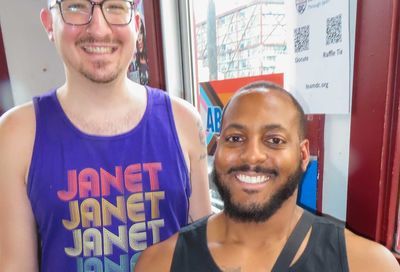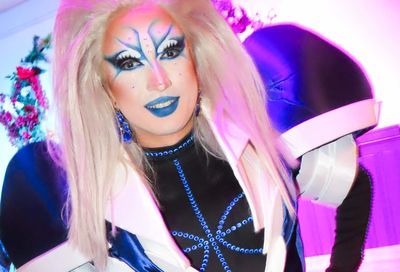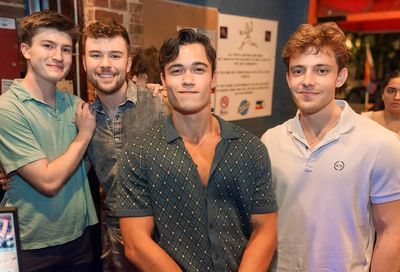ACT’s Alan Sharpe readies the 29th Annual DC Black Pride Showcase this weekend
The 2021 festival kicks off May 30 with five short plays, adding more throughout the week

They say you never forget your first. Alan Sharpe certainly hasn’t.
“There was a lot of trepidation, a lot of people afraid to go,” Sharpe says, recounting the time, more than thirty years ago, when DC Black Pride launched itself in a very public way over Memorial Day Weekend: a daytime gathering at Banneker Field across Georgia Avenue. “It was so visible. Everyone wondered if people would even show up. This was a time when people were very closeted.”
People showed up all right. And to a degree that had a lasting, significant impact on the 68-year-old playwright and director. “I was so inspired by that experience that the next year, when they announced they were going to do it again, I had written a play at a small, black box theater at UDC.”
The play was received enthusiastically and, after the performance had finished, audience members stood up and “shared their stories and their journeys and their situations,” Sharpe says.
“It became very obvious very quickly that this was something that was needed — to see our lives and our experiences, our challenges, our dreams, our hopes take center stage, rather than LGBTQ characters always being on the edges of the story, or the best friend, or the comic relief, the target of derision. In particular, it was not something that you saw a lot in terms of the Black LGBT community.”
Originally designed to focus on one full-length play, written by Sharpe and read by a cast of actors, the annual DC Black Pride Showcase presented by Sharpe’s African-American Collective Theater has evolved over the years to become a collection of short, one-act plays — generally 10- to 15-minutes in length — all written by Sharpe and featuring different casts.
“Short plays allowed us to have more flexibility and deal with more subjects,” says Sharpe. “It also gave us an opportunity to work with a lot more actors who come back year after year to perform with us.” In recent years, the showcase has further morphed from a one-night affair into a weeklong festival. The 2021 festival kicks off Sunday with five short plays, adding more throughout the week, and wrapping on the following Sunday, June 6, with an encore of all the plays. In that way, the festival “acts as a bridge” between Black Pride Weekend and the start of Capital Pride.
In the last three decades, Sharpe estimates he’s contributed 170 different plays to the cause. This year’s program, the virtual “Screen/Plays,” features 12 newly written works, a mix of comedies and dramas, exploring topical issues and themes specific to LGBTQ sex and sexuality, love and relationships, and family dynamics. “We’re trying to tell in-depth, relevant stories about the way people live their lives,” he says.
These days, Sharpe typically writes with particular actors in mind. “I look at the pool of actors that we have available to us and write things that they are right for, and then try to tell stories that interest me and convey themes that are relevant.” For this year’s program, Sharpe has cast nearly three dozen performers, a diverse roster rich with ACT veterans, including Monte J. Wolfe, Michael Ward, Barbara K. Asare-Bediako, Wilma Lynn Horton, Erika Jones, Douglas Ruffin, Gregory Ford, Keanna Faircloth, and Morgan Duncan.

“The actors are the core, the heart and soul, the catalyst,” he says. “Without them, the plays I write would be paper in a drawer or files on a hard drive somewhere, because you can’t do theater without performers and an audience.”
You can do it online, however, a fact that Sharpe has been pleased to learn as a result of the pandemic. “Last year, we noticed that people were finding out about it on social media and turning up from across the country. It’s enabled us to broaden our audience and raise our visibility in a huge way.”
That includes reaching people who are still closeted or deeply guarded about their sexuality, as well as those just beginning to question their identity. “Strangely enough, in 2021, there are still people who are afraid to come to our plays because they don’t want to be seen in the audience and have people assume they are gay or lesbian,” Sharpe says.
“There’s a certain comforting anonymity about the Internet,” he continues. “People feel that they can see [the plays] without feeling like it’s going to get back to their entire world that they did it. And that has been gratifying, especially to hear from young people.”
Screen/Plays launches Sunday, May 30, at 7 p.m., with additional screenings through June 6. Free, with a suggested donation of $10. Advance registration required. Visit www.a-act.org.
Read More:
FX’s ‘Pride’ documents the modern LGBTQ+ rights movement
Capital Pride unveils a host of colorful, vibrant June events
Support Metro Weekly’s Journalism
These are challenging times for news organizations. And yet it’s crucial we stay active and provide vital resources and information to both our local readers and the world. So won’t you please take a moment and consider supporting Metro Weekly with a membership? For as little as $5 a month, you can help ensure Metro Weekly magazine and MetroWeekly.com remain free, viable resources as we provide the best, most diverse, culturally-resonant LGBTQ coverage in both the D.C. region and around the world. Memberships come with exclusive perks and discounts, your own personal digital delivery of each week’s magazine (and an archive), access to our Member's Lounge when it launches this fall, and exclusive members-only items like Metro Weekly Membership Mugs and Tote Bags! Check out all our membership levels here and please join us today!























You must be logged in to post a comment.